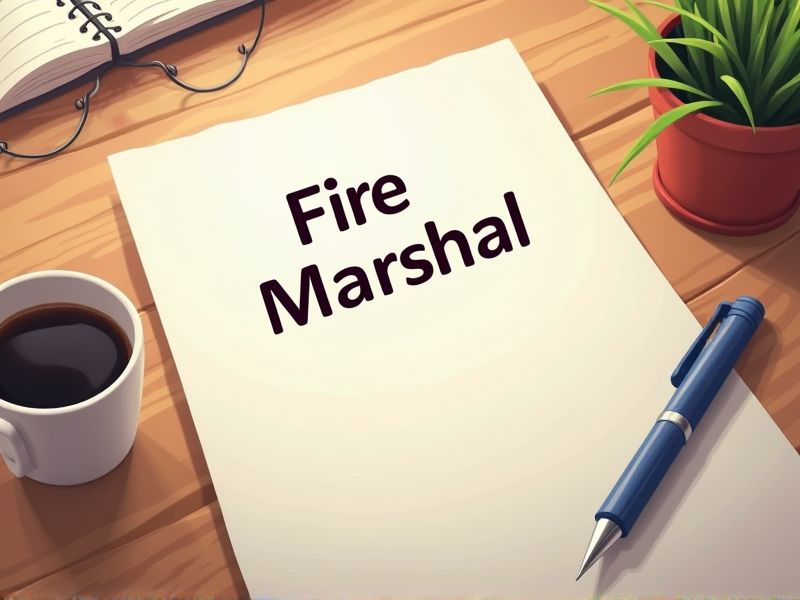
A Fire Marshal plays a critical role in ensuring public safety by preventing fires and mitigating their impact. Their duties often require specialized knowledge and skills, which necessitates obtaining specific certifications. These certifications validate a Fire Marshal's competence in areas such as fire investigation, inspection, and code enforcement. Here are some key certifications that may be essential for a Fire Marshal.
NFPA Certified Fire Officer (NFPA 1021)
NFPA Certified Fire Officer (NFPA 1021) provides a standardized understanding of leadership and management necessary for a Fire Marshal's role, ensuring consistency in fire safety practices. Certification ensures that individuals are well-versed in crucial skills such as risk assessment and emergency management, essential for effectively overseeing fire prevention and control programs. A certified Fire Officer is better equipped to develop and enforce fire safety regulations, reducing fire-related incidents and enhancing public safety. Public trust in fire safety enforcement increases when a Fire Marshal possesses recognized credentials like the NFPA 1021 certification.
Certified Fire Inspector (CFI)
Certified Fire Inspectors (CFIs) provide expertise which reduces fire risks in communities, directly increasing public safety. Their detailed understanding of fire codes helps enforce regulations, ensuring compliance in both residential and commercial settings. CFIs conduct thorough investigations to determine causes of fires, offering critical insights that aid in preventing future incidents. Employing CFIs enhances the credibility and effectiveness of a Fire Marshal's office, validating their strategies and policies through professional certification.
National Fire Academy Certification
National Fire Academy Certification is essential for a Fire Marshal because it ensures they have received comprehensive training in fire prevention, protection, and emergency response strategies. This certification enhances their ability to effectively enforce fire codes and regulations, thereby reducing fire risks in communities. It also provides them with updated knowledge on the latest firefighting techniques and technologies, improving their capability in critical situations. The certification serves as a standardized measure of expertise and professionalism, fostering trust and credibility among the public and within the fire service industry.
OSHA 30-Hour General Industry Certification
Fire Marshals face hazardous environments, and OSHA 30-Hour General Industry Certification provides essential safety training, reducing injury risks on the job. This certification educates fire marshals on regulatory compliance, making them better equipped to enforce safety standards. Familiarity with OSHA guidelines through the certification helps in identifying potential workplace hazards, ensuring prompt preventive action. Acquiring this certification enhances a Fire Marshal's credibility, reinforcing their role in safeguarding both public and occupational safety.
FEMA National Incident Management System (NIMS) Certification
FEMA's National Incident Management System (NIMS) Certification standardizes incident response protocols, ensuring Fire Marshals can effectively coordinate with other agencies during emergencies. Certification equips Fire Marshals with the necessary skills to implement resources strategically in both routine and large-scale incidents. Shared training and language enhance communication, reducing misinterpretations that might hinder emergency response efforts. Adhering to NIMS fosters public trust and demonstrates a commitment to maintaining a high level of preparedness.
HAZMAT Awareness Certification
Fire Marshals must often assess hazardous materials incidents, and HAZMAT Awareness Certification ensures they can identify and classify these substances accurately. Possessing this certification equips Fire Marshals with the foundational knowledge needed to recognize potential dangers, minimizing risks during emergency responses. Certification enables effective communication with specialized HAZMAT teams, ensuring a coordinated and efficient response. Regulatory compliance often mandates that Fire Marshals hold this certification, aligning with occupational safety standards and legal requirements.
Fire Protection Systems Designer Certification
Fire Protection Systems Designer Certification ensures a Fire Marshal possesses the technical expertise required to evaluate and approve complex fire safety plans accurately. This certification enhances credibility and assures stakeholders that fire safety measures comply with industry standards. It facilitates effective communication between the Fire Marshal and engineers, leading to more efficient fire protection system planning. Regulatory bodies often require such certification to maintain consistency and ensure public safety in building and infrastructure projects.
Building Code and Fire Safety Inspector Certification
Building Code and Fire Safety Inspector Certification equips a fire marshal with the necessary knowledge to ensure compliance with safety regulations. This certification enables the fire marshal to identify potential hazards, which reduces the risk of fire-related incidents. Mastery of building codes through certification allows for thorough inspections, promoting the protection of lives and property. Furthermore, certified fire marshals can provide expert guidance on safety improvements, enhancing overall community resilience.
Emergency Management Institute (EMI) Certification
The EMI certification equips a Fire Marshal with essential skills in emergency response planning and disaster management. It ensures that the Fire Marshal stays informed about the latest protocols and techniques, enhancing overall public safety. This qualification helps verify the Fire Marshal's ability to effectively coordinate with other agencies during emergencies. It lays a foundation for effective resource management and strategic decision-making in crisis scenarios.
Certified Safety Professional (CSP)
A Certified Safety Professional (CSP) credential ensures a fire marshal has a deep understanding of safety regulations and best practices, reducing the likelihood of errors during inspections. Advanced risk assessment skills gained through CSP certification enhance a fire marshal's ability to identify and mitigate fire hazards effectively. The credential signifies a commitment to ongoing education, ensuring the fire marshal stays current with evolving safety standards. Employers and the public gain increased confidence in a fire marshal's expertise and decision-making when they possess such a recognized certification.
Summary
When you obtain certifications as a Fire Marshal, your credibility and expertise in safety protocols significantly increase. This recognition can lead to career advancement opportunities and higher responsibilities within your department. The certifications often result in better preparedness and decision-making skills during fire emergencies. You may also become a key figure in training programs and community safety initiatives, enhancing public trust.
